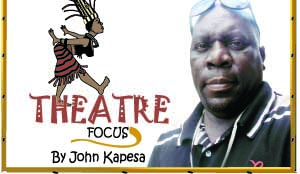 IN the theatre arts loop, as in many other facets of arts, music, dance, fine art and sculpture there are occasional rights, dispensations and licences – opportunities to entertain, largely to inform, edify and tutor the general public.
IN the theatre arts loop, as in many other facets of arts, music, dance, fine art and sculpture there are occasional rights, dispensations and licences – opportunities to entertain, largely to inform, edify and tutor the general public.
Nonetheless, all these forms of artistes should commonly admit that even when they are ingeniously and creatively gifted with skilful abilities, they are not devoid of absolute knowledge nor do they have sole ideas to subscribe to anything and everything.
Artists need experiences, personal or otherwise, aptitudes and lessons. Additionally, growing up are individual experiences – workshops and seminars will tremendously add value to inert talents.
So, the National Arts and Theatre Association of Zambia (NATAAZ should be decorated for securing a berth with the International Organisation for Migration (IOM) allowing for 30 NATAAZ individual affiliates as participants from five provinces for an open session of knowledge acquisition and sharing on issues to do with migrants and their associated encounters.
And the NATAAZ vice-general secretary Mike Tembo confirmed during the week that the workshop in partnership with IOM takes place this week on Tuesday, July 15 to Friday 18 at Fairview Hotel in Lusaka.
According to Mike, NATAAZ is thrilled and energised as such an event was one of the planned itineraries during which time theatre artistes will learn about IOM so that thereafter, they can incorporate the information in their artistic works and operations, and further the dramatic activities of theatre clubs and NATAAZ.
So what is the so-called United Nations’ IOM all about? The IOM Migration health officer Nomagugu H. Ncube in Lusaka admits that theatre was a rich resource through which the IOM can broadcast and propagate information to the public, and stem the needless movement of people from one country to another. Similarly, the IOM intends to unveil, equip and furnish participants with essential information on the rights and privileges of migrants; they too have human rights.
Accordingly, IOM summarily targets and aims at educating the public on the need to mold legal guidelines necessary for moving from one country to another.
For instance the IOM unveils the need to possess travel documents; passports, visa, medical reports and tickets if anyone wished to travel across border areas.
Though migration laws vary from country to country, generally irregular migrants can face imprisonment, deportation and this and much more is what is on the plate for the participants this week.
In one of the IOM booklets, the organisation cites the story of a 14-year-old Zimbabwean boy called Macdonald who lived on the streets in Harare following the death of his parents.
The harsh life Macdonald engaged in made him start thinking of a better life by migrating to another place. One day he jumped on the bus to Lusaka. With no travel documents, he ensured that no one saw him at the border.
Upon arrival in Lusaka, Macdonald is stranded and gets discovered by the police, consequently, he falls ill due to the tough environment and careless surrounding.
He is moved from detention to an orphanage for boys, while IOM facilitates for his medical attention and tried to identify his needs.
Macdonald wished to go back to Harare, but not back to the streets. IOM secures a plane ticket, facilitates for his travel documents with the Zimbabwean embassy and escorts him back to Harare.
Upon arrival, IOM arranges for Macdonald to be sheltered in a place that is able to take care of him and give him a safe environment to grow up from.
Resource personnel include Nomagugu Ncube and Mercy Halwidi, outreach officers at IOM in Lusaka, Zambia.
Mike said of IOM, “As NATAAZ, we are grateful the IOM officers responded positively to our request on the concept to address internally displaced peoples’ issues among other matters such as the gender-based violence and HIV/AIDS among theater artists.”
Mike said the itinerary programme will tackle concerns on safe migration, human trafficking and the health impact of migration.
“NATAAZ has provided the artistic manpower and believe that theatre is a vital tool in disseminating such information for it entertains, instructs and educates,” the vice general secretary said emphasising the workshop was an eye opener to ambitious artistes in theatre and others who intend going out of the country to exploit their talents to be wary of the vices of migration.
Agreeably, many artistes are vulnerable, and risk being duped by human traffickers that there are opportunities for them particularly when promises of a professional career are dangled in front of their noses.
Mike bemoaned admitting that Zambian artistes have once before fallen prey to such tricks.
The cause of HIV/AIDS pandemic has not spared the theater fraternity because as several, vibrant and upcoming theater artists have passed on.
It is hoped the workshop will assist the participants into behavior change. On the GBV, it is assured knowledge on the matters will reassure promotion through theatre.
Mike admitted that NATAAZ with funds available had planned several workshops and events to coincide with the Golden Jubilees celebrations of Zambia’s political independence, and NATAAZ has set October 29 to November 1 for the annual theatre festival at Lusaka Playhouse.
John.kapesa818@yahoo.co.uk – 0955-0967-0977-710975.






